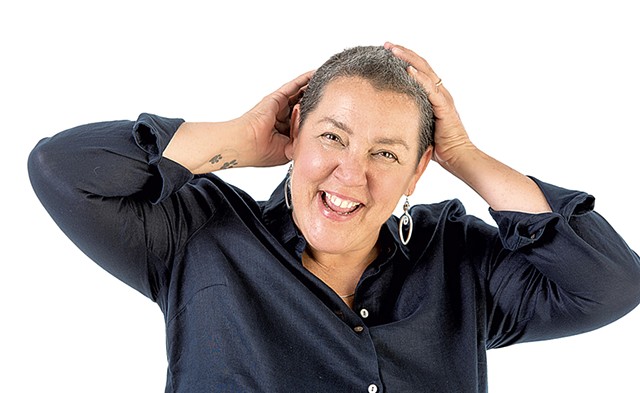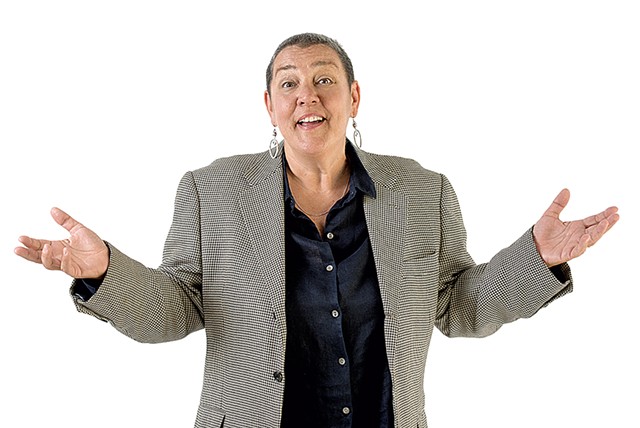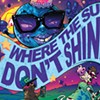Switch to the mobile version of this page.
Vermont's Independent Voice
- News
- Arts+Culture
- Home+Design
- Food
- Cannabis
- Music
- On Screen
- Events
- Jobs
- Obituaries
- Classifieds
- Personals
Browse News
Departments
-
Education

Scott Official Pushes Back on Former State…
-
News

Burlington Budget Deficit Balloons to $13.1 Million
-
Education

Senate Committee Votes 3-2 to Recommend Saunders…
- Court Rejects Roxbury's Request to Block School Budget Vote Education 0
- Norwich University Names New President Education 0
- Media Note: Mitch Wertlieb Named Host of 'Vermont This Week' Health Care 0
Browse Arts + Culture
View All
local resources
Browse Food + Drink
View All
Browse Cannabis
View All
-
Culture

'Cannasations' Podcaster Kris Brown Aims to 'Humanize'…
-
True 802

A Burlington Cannabis Shop Plans to Host…
-
Business

Judge Tosses Burlington Cannabiz Owner's Lawsuit
-
Health + Fitness

Vermont's Cannabis Nurse Hotline Answers Health Questions…
-
Business

Waterbury Couple Buy Rare Vermont Cannabis License
Browse Music
View All
Browse On Screen
Browse Events
Browse Classifieds
Browse Personals
-

If you're looking for "I Spys," dating or LTRs, this is your scene.
View Profiles
Special Reports
Pubs+More
In Her New Comedy Show, Josie Leavitt Confronts Cancer
Published September 19, 2018 at 10:00 a.m. | Updated December 11, 2018 at 5:15 p.m.
In the standup comedy classes she used to teach, Josie Leavitt imparted one key piece of advice to her students. Aside from tips on joke construction and timing, it's her most fundamental nugget of comic wisdom.
"I would tell them that you can have a bad day, and you can have a funny day," she says to Seven Days at the dining room table of her home in Charlotte. "But guess what? They're the same day."
The idea that it's possible, even essential, to find humor in life's most difficult moments is indispensable to the Vermont comedian's own voluminous body of work. Lately, the founder of the Vermont Comedy Divas and self-described "mother hen" of the local comedy scene has put that principle to its greatest test. Those bad, funny days are central to Leavitt's new one-woman show, "So This Happened," which takes place Thursday and Friday, September 20 and 21, at the Flynn MainStage in Burlington.
Early this year, Leavitt, 53, was diagnosed with breast cancer. From the outset, her prognosis was relatively good. The cancerous lump was detected early, before it could metastasize, and was completely removed. Her subsequent treatments, which included several rounds of chemo and radiation, reduced the likelihood of recurrence to minuscule numbers.
"I was lucky," she says.
That's true, perhaps in more ways than one, for a woman who excels at finding hilarity in hard times.
"A lot of my friends are comics," Leavitt says. "And they were like, 'I'm so sorry about the cancer. But fuck you for the material.'"
"I never begrudged her the material," says fellow Comedy Diva Tracie Spencer. "But we all knew she would get some out of it, which I was happy about."
Leavitt started doing standup in 1993 and gigged regularly at comedy clubs such as Carolines on Broadway and the Comedy Cellar in her native New York City. In 1996, she moved to Vermont with her then-partner, Elizabeth Bluemle, to open the Flying Pig Bookstore in Charlotte. Leavitt worked at the store, since relocated to Shelburne Village, for 20 years. More recently, she worked for the Pride Center of Vermont in Burlington, serving as the nonprofit's interim executive director in late 2016 and becoming development director in 2017. She left the Pride Center in July to focus on her health.
After Leavitt moved to Vermont, she recalled, it took her nearly a decade to get back into standup. That was at least in part because, at the time, a comedy scene didn't exist. These days, it's not hard to trace the origins of the state's vibrant comedy community to Leavitt herself.
"Josie is a pioneer," says Spencer. "She was one of the first [Vermont] comedians out there, period."
The same year Leavitt returned to the stage, 2005, she debuted a semi-regular standup series called "Stand Up, Sit Down and Laugh," which featured almost exclusively local comics and continues to this day. In 2006 she founded the Divas as an all-female, five-member troupe.
At about the same time, Leavitt began teaching standup, primarily through the Flynn Center for the Performing Arts but sometimes in less conventional settings — including a women's prison. Numerous alums from her classes have found success in comedy, in and beyond Vermont, and helped shape the local scene. That list includes comedian Nathan Hartswick. He and his wife, comedian Natalie Miller, opened Vermont Comedy Club in 2015 after years of presenting shows and teaching classes under their Spark Arts banner.
"What they've done with the club is simply amazing," says Leavitt of the couple. She adds that she stopped teaching standup in 2015 partly because VCC's classes were so effective.
Another notable Leavitt alum is Carmen Lagala. Now a rising comic in Brooklyn, the Vermont native made her national television debut on the "The Late Show With Stephen Colbert" in August. Leavitt recently uncovered notebooks from her old standup classes in which she had jotted observations on her students. One contained a curiously prophetic line about Lagala scribbled in the margins.
"It said, 'Remember her name,'" says Leavitt with some pride.
"She has always supported other women in comedy," says Spencer. "And she's always given back to the community."
Before her diagnosis in February, Leavitt had just begun to work on her new show. She envisioned a straight standup set through which, in her typically witty fashion, she would transform trivial details of her day-to-day life into comedic gold.
Cancer changed her plans. "I was like, 'Oh, this show's gonna write itself!'" she says.
That's not entirely a joke. It's also not entirely true.
Beside her dining room table, in front of a large bay window, stands an unplugged mic on a stand. That's where Leavitt writes. She starts by riffing out loud until jokes, and then entire bits, congeal. It's an almost ritualistic routine — when she's practicing and writing, she wears the same shoes she'll don when performing. "It literally grounds me," she explains.
Throughout her cancer treatment, Leavitt worked on new material about the experience in exactly that fashion, once in the morning and then again, provided she had the energy, at night. While the process remained the same, the results differ from what longtime fans may expect.
Leavitt has always been a storytelling comic, creating hybrids of jokes and narrative, but in "So This Happened" she leans even further into the latter. It's a safe bet the show will be funny, but audiences should be prepared for serious and vulnerable moments, too.
"She will tell you everything," Montpelier comedian Kathleen Kanz says of Leavitt. "There's absolutely nothing she'll withhold, and she's happy to explore the darkest, most intimate parts of her life."
Kanz, the founder of the Green Mountain Comedy Festival and 2016 winner of the Vermont's Funniest Comedian contest, is referring specifically to Leavitt's comedic style. But her words offer a clue to the depths her friend's stories might plumb.
"The storytelling is different for me because it tends to go a bit darker," says Leavitt, explaining that she weaves comedy around the tales she spins.
As an example, she points to her contribution to a recent storytelling event, which she titled "Sanctimonious Bitch."
"It's what I want to say to people who have said to me, 'I would never do chemo because it's poison,'" says Leavitt. "A: Shut up. And B: Is that helpful to say to someone who is going through chemo?"
In her comedy, Leavitt regularly skewers absurdity. But she almost always does so with the grace of a fencer wielding an épée. At storytelling events, she deploys another, less elegant tactic: blunt force.
"It's an intense piece, because I get angry, and I don't usually get angry in standup because there's really no room for it, the way I perform," Leavitt says of "Sanctimonious Bitch." Then, speaking to the hybrid nature of "So This Happened," she adds, "There are some moments of deep feeling and me being honest about what's going on in a way that I wouldn't if it was just a straight standup show."
Still, it's a Leavitt show, and she is unlikely to skimp on the laughs — especially about cancer.
"I'm a very personal comic to begin with," says Leavitt. "I'm not the kind of comic who sits around and thinks, What could be funny? I think, What happened today that's funny?
"And, God, there's a lot of opportunity with cancer to have fun with it," she continues. "You have to, or you're gonna lose your mind."
Fortunately, Leavitt kept both her sanity and her sense of humor throughout her ordeal. She recently met with Seven Days to talk about battling cancer and turning bad days into funny ones.
SEVEN DAYS: What went through your mind when your doctor told you that you had cancer?
JOSIE LEAVITT: I kinda had a sense that something was up. I'd had a mammogram at the end of January after having skipped them for three years. Which, women out there, people with breasts: Don't ever do that. Just don't skip 'em.
Anyway, they said, "We'll call you if we need to take another view." I've had, like, five biopsies, and never has anything come up. But I just had a bad feeling.
That was on a Tuesday — Wednesday, Thursday, Friday, no phone call. And I'm like, "Ah! I've got this." Then Monday rolls around, and they call me, and they want a mammogram, an ultrasound and a biopsy. And I thought, Oh, they see something, and they want to confirm that they see something.
SD: Uh-oh.
JL: So I called my doctor and told her what was going on and asked what she thought. And she looked at the mammogram results and said, "I think you're gonna be OK. I don't see the word 'spiculated.'" And I was like, OK, spiculated, spiculated — that means something.
So I go to the ultrasound, and they can't tell me anything. But my friend is the ultrasound tech and my girlfriend is with me, so I feel very comfortable. But I still have a bad feeling. And it just looked funky on the ultrasound; it didn't look round. So I asked, "Does it look spiculated to you?" And she said, "Actually, yes."
And I thought, Oh, fuck me.
SD: So when did they finally tell you?
JL: That was on a Wednesday, and they told me on a Friday. And they tell you on the phone; they don't bring you in. Ellen, I think, from the breast cancer center calls you and tells you that you have breast cancer.
SD: What did you do next?
JL: I called my girlfriend and said, "I have breast cancer." She said, "Come to my office right now." So I did, and we just sort of stood there, like, "Whoa, cancer."
SD: It didn't take long to sink in, then.
JL: It sinks in, but then it doesn't sink in. Because the thing with breast cancer is that you don't feel unwell. Treatment makes you feel horrible. But unless you have Stage 4 and it's metastasized ... for the most part, I felt fine. Breast cancer doesn't hurt; it doesn't affect your appetite. It's isolated because it's its own little system. But you still think, Oh, my God, I have cancer.
So then I talked to [Bluemle], and I went to the bookstore. And a former coworker there came in with her 4-month-old puppy. So we had puppy therapy, which is great. If you've just found out you have cancer, play with a dog. Not just a dog, a puppy. And not just a puppy, a Lab puppy.
And then I spent the rest of that day on the phone.
SD: That has to be one of the most draining parts of the diagnosis: telling people about it.
JL: My immediate circle of family and friends knew that I was waiting for the results. And people had big reactions. So I found myself in some instances having to manage their reactions. Like, some people started sobbing. And I was like, "No, this is not a sobbing event."
But I realized that they have to control it their way, and everyone is having a different experience of it. It's just a weird experience.
SD: So where does the humor enter in?
JL: One thing that happens — and I'm generally kind of a don't-give-a-shit person, anyway — is that you really don't give a shit. I told my boss [at the Pride Center], "Dude, watch out." He's like, "Can you do this?" And I'm like, "Nope. Can't. Not going to. Cancer."
One of my coworkers was very upset that I had cancer. And every time he'd walk by my office, he had this little tear. And I'm like, "Please stop."
So one day he asked me, "You know, it's your turn to clean the bathroom." And I said, "I can't clean the bathroom ... I have cancer!" And that's what he needed to hear.
I took the garbage out — I wasn't going to clean the bathroom. And I could hear him laughing until I got back from bringing out the recycling. And he said, "Thank you. I needed that."
SD: It can't always have been easy to laugh about, though.
JL: What made it easy for me was that I knew this cancer wasn't going to kill me. I always felt that. It was small, no lymph node involvement, amazingly clear margins. Great. I didn't think it was going to kill me, so I had that fear removed through doing everything that they thought I needed to do to make sure the cancer never came back.
SD: So you never had that "Time to get right with Jesus," confront-my-mortality moment.
JL: I'm not that kind of person. And it wasn't pancreatic cancer or Stage 3. I used to say this was JV cancer — it's never really getting off the bench. And every step along the way, every doctor told me I had a 20 percent or less chance of needing chemo. And I kind of clung to that. Obviously, my hair is shorter than yours right now, so they were wrong about that.
SD: I guess they had about a 20 percent chance of being wrong, right?
JL: I took my 15-year-old nephew out for lunch and told him what was going on. And he said, "No, my moms have told me. What about chemo?" I told him less than a 20 percent chance. Then he leaned in and said, "Twenty is a pretty big number."
[I said,] "Shut up, math boy."
SD: Chemo can be brutal. How was your experience?
JL: No one wants to do chemo. It was particularly challenging because, at the very beginning of the second round, I got a stomach bug, and I thought it was the cumulative effect of the chemo. And I thought, I can't do this.
The beauty part of that, and of not totally believing the doctors when they told me it was a bug and not chemo, was that, when round three rolled around and I didn't have a stomach bug, I was like, "Oh, piece of cake!" It was so much easier that, when round four rolled around, I didn't give a shit, because I only had to do four rounds.
That and medical marijuana. Medical marijuana for the win!
SD: If you're gonna get cancer, getting it in a time when medical marijuana is available is at least something.
JL: Medical marijuana was wonderful. I'd go in [to the dispensary] and be like, "Anxiety! Whaddya got? Stomach stuff! Whaddya got?" They did better titrating what I needed than anybody else.
SD: How did you feel about losing your hair during chemo?
JL: I knew it was going to be hard for me. I had long, thick, curly hair, which I was known for. Kinda like Samson, my ex-wife used to say. Almost immediately after finding out, I reached out to my friend Shari Powers, who owns Sequoia Salon, and said, "Here's where I'm at. Help me." We did a really short, cute haircut. I loved that haircut. I looked adorable!
Then chemo started. What they don't tell you is that when you lose your hair from chemo, it hurts, so much. Whatever chunk of hair you're about to lose hurts so much you can barely put it on the pillow. It's excruciating. So then we went with basically a buzz cut, so that when it fell out it wouldn't hurt quite so much.
So, I went from almost waist-length hair to above-shoulder-length hair to basically a crew cut. Then, when it really started falling out, because it was so short, I basically looked like a Chia Pet.
SD: Oh, my...
JL: I looked horrible. Some of it was scraggly. I looked like a burn victim. So I went back to Shari and said, "Fix this." So she buzzed it down, and I was bald.
The striking thing was that my face was so tan and my scalp was so white that people thought I had just buzzed my head and dyed it platinum. Like, "You look kinda cool."
And, as it turned out, I look pretty damn good bald. I have a great head. So I said, "Fuck it. I'm just gonna be bald." And I never ever thought I'd do that. I thought I'd have a wig or hats. And I do still have some hats — I had about 20 that friends had given me.
But I just kind of rocked it. And my girlfriend was super supportive of me being bald. She kept saying, "You're gonna look great." And she said it with such conviction that I believed her. It turned out she wasn't that sure and just said that, which is really great.
SD: The hair thing must have led to funny moments, though.
JL: I got called "sir" by a police officer. He pulled me over, and it was hilarious. He was so overly apologetic. I was like, "Dude, it's OK." But it definitely got me out of the ticket.
SD: He can't really give you a ticket after that, right?
JL: Especially when I'm on my way to radiation, which I was. I told him I was on the phone with the radiation office. [Whispers:] But I wasn't, I just had time to think of that.
He kept fist-bumping me, and I was like, "Dude, really, I need to go. Thank you for the love, but I'm gonna be late now. I only have three more of these left, and I don't want to have four because you made me late."
SD: Now your hair is starting to grow back, which must be a great feeling.
JL: I'm starting to use just the tiniest bit of shampoo, and I'm like, "Oh, I missed that." And now it's weird having hair.
But the weird thing about not having hair — and they said this, but I didn't believe them — is that you're gonna get cold. It is freezing without hair. I would sleep in a Skida hat, the local hat company. They make perfect hats for cancer patients because they're fleece lined; there are no seams, and they keep your head warm.
SD: Did you consider a turban?
JL: People got me turbans. But I didn't want that. I always felt like you look sicker if you look like a cancer patient in one of those turbans than you would if you're just like, "OK, I'm bald. You figure out if I have cancer or not."
But the upshot is that if I ever have a hair crisis, I know I can shave my head and look like a badass. So I'm fine with that.
SD: You spoke earlier about managing the reactions of people you told about the initial diagnosis. As you progressed, how did you manage the reactions of people you encountered day-to-day?
JL: It was such a pain in the ass. It just happened today, in fact. This guy asked me, "Oh, did you just finish treatment? Good for you." And that should be it, right? But then he launches into 10 minutes talking about his mother's battle, her losing battle, with cancer.
What I discovered was that very few people are comfortable saying, "How are you?" and letting it sit there. And I have been guilty of this and still have to check myself even though I'm a cancer survivor. We like to make connections with people. And what happens when you make a connection with someone who is battling cancer is, now you've taken the focus of the conversation away from the person with cancer and made it all about you. It's not about you.
In this instance, our job as the listener is to shut the fuck up and let that person dictate what needs to get said or not said. And that's the hardest thing. I had a therapist who said that just because there's silence doesn't mean you drive a truck through it. But I think we all have that instinct. And maybe some people aren't comfortable just saying, "How are you?" because maybe they don't really want to know how sick you might be or be reminded of when their Aunt Betty died.
SD: I do it, too. And people did it to me when my parents were going through cancer. But I mostly feel like it's a product of people struggling to find a way of relating to something that just isn't relatable.
JL: I did it, too. I said, "Oh, my mom had breast cancer. It's been 15 years; my mom's fine." That's great. That says, "I don't want to talk about what fear you might have been having, because all the people I know with breast cancer have been fine." But people need space, and they need people to talk to about being afraid.
When I was waiting for the biopsy, everyone was like, "Oh, you're gonna be fine!" But I had one friend who looked at me and said, "What are you gonna do if you're not fine?" And I said, "Oh, my God, thank you for asking!"
Not everyone wants to open the door to that kind of discussion.
SD: It's a hard discussion to have.
JL: It is. People have said the stupidest things to me. Like, one person told me, "Don't believe them when you're five years out and cancer free. My friend was just told that, and 20 years later her cancer came back." I was like, "I'm buying wine. How is this helpful?"
Then someone wanted to tell me an inspirational story of someone who died of cancer. No one fighting cancer wants to hear about someone who died of cancer.
Related Locations
-
Flynn Main Stage
- 153 Main St., Burlington Burlington VT 05401
- 44.47566;-73.21311
-
 802-863-5966
802-863-5966
- www.flynnvt.org…
Related Stories
Got something to say?
Send a letter to the editor
and we'll publish your feedback in print!
Tags: Comedy, Josie Leavitt, So This Happened, cancer, breast cancer, Flynn MainStage, Flynn Main Stage, Video
More By This Author
About The Author

Dan Bolles
Bio:
Dan Bolles is Seven Days' assistant arts editor and also edits What's Good, the annual city guide to Burlington. He has received numerous state, regional and national awards for his coverage of the arts, music, sports and culture. He loves dogs, dark beer and the Boston Red Sox.
Dan Bolles is Seven Days' assistant arts editor and also edits What's Good, the annual city guide to Burlington. He has received numerous state, regional and national awards for his coverage of the arts, music, sports and culture. He loves dogs, dark beer and the Boston Red Sox.
Speaking of...
-

Ruth Bader Ginsburg Show Comes to the Flynn
Feb 25, 2024 -

All-Star Vermont Musicians Channel Bob Dylan for Flood Relief at the Flynn
Aug 10, 2023 -

Slick Rick Replaces Arrested Development as Headliner for Burlington's Juneteenth Celebration
Jun 16, 2023 -

Al Franken Blends Satire and Political Commentary at Flynn Show
Sep 19, 2022 -

Vermont Symphony Orchestra Seeks Contributors for New DBR Piece
Aug 24, 2022 - More »
Comments
Comments are closed.
From 2014-2020, Seven Days allowed readers to comment on all stories posted on our website. While we've appreciated the suggestions and insights, right now Seven Days is prioritizing our core mission — producing high-quality, responsible local journalism — over moderating online debates between readers.
To criticize, correct or praise our reporting, please send us a letter to the editor or send us a tip. We’ll check it out and report the results.
Online comments may return when we have better tech tools for managing them. Thanks for reading.
- 1. A Former MMA Fighter Runs a Wildlife Rehabilitation Center in Cabot News
- 2. Legislature Advances Measures to Improve Vermont’s Response to Animal Cruelty Politics
- 3. This Manchester Center Family Is a National Show Horse Powerhouse Animals
- 4. Pet Project: Introducing the Winners of the 2024 Best of the Beasts Pet Photo Contest Animals
- 5. The Magnificent 7: Must See, Must Do, April 24-30 Magnificent 7
- 6. Welch Pledges Support for Nonprofit Theaters Performing Arts
- 7. Q&A: Downtown Montpelier Transforms Into PoemCity Every April Stuck in Vermont
- 1. How a Vergennes Boatbuilder Is Saving an Endangered Tradition — and Got a Credit in the New 'Shōgun' Culture
- 2. Video: The Champlain Valley Quilt Guild Prepares for Its Biennial Quilt Show Stuck in Vermont
- 3. Waitsfield’s Shaina Taub Arrives on Broadway, Starring in Her Own Musical, ‘Suffs’ Theater
- 4. Video: 'Stuck in Vermont' During the Eclipse Stuck in Vermont
- 5. Pet Project: Introducing the Winners of the 2024 Best of the Beasts Pet Photo Contest Animals
- 6. This Manchester Center Family Is a National Show Horse Powerhouse Animals
- 7. Crossing Paths: An Eclipse Crossword 2024 Solar Eclipse







































